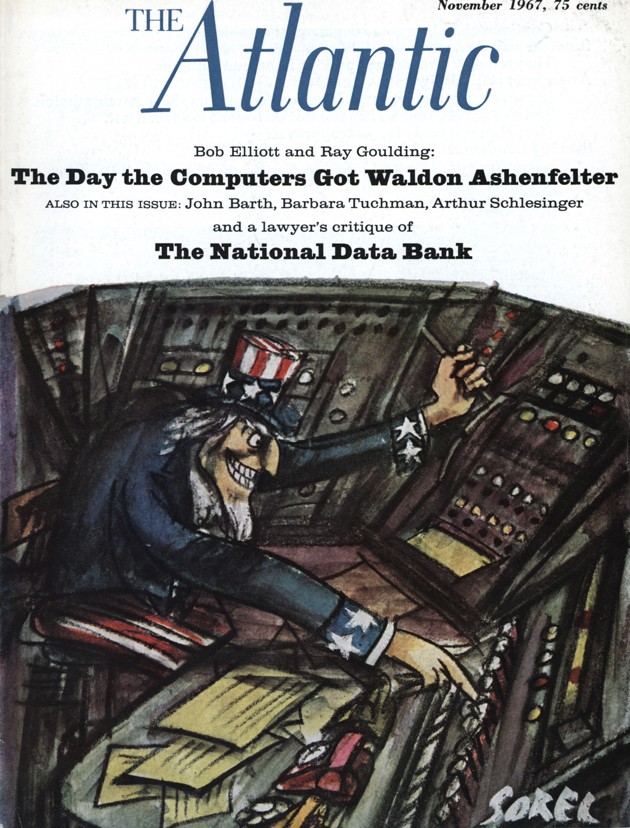

In a November 1967 cover story for The Atlantic Monthly, Arthur R. Miller, a law professor at the University of Michigan, wrote about the dangers of a federal proposal to build a National Data Center. The proposal was dropped amid public outcry, but a version of the same idea came to fruition decades later with the creation of the National Security Agency’s Utah Data Center.
This November’s cover story, “If You’re Not Paranoid, You’re Crazy,” by Walter Kirn, is also concerned about the U.S. government looking into our lives at ever-increasing levels. Miller’s warnings from 48 years ago, excerpted below, seem eerily prescient:
A Data Center poses a grave threat to individual freedom and privacy. With its insatiable appetite for information, its inability to forget anything that has been put into it, a central computer might become the heart of a government surveillance system that would lay bare our finances, our associations, or our mental and physical health to government inquisitors or even to casual observers. Computer technology is moving so rapidly that a sharp line between statistical and intelligence systems is bound to be obliterated. Even the most innocuous of centers could provide the “foot in the door” for the development of an individualized computer-based federal snooping system. ...
The very existence of a National Data Center may encourage certain federal officials to engage in questionable surveillance tactics. For example, optical scanners—devices with the capacity to read a variety of type fonts or handwriting at fantastic rates of speed—could be used to monitor our mail. By linking scanners with a computer system, the information drawn in by the scanner would be converted into machine-readable form and transferred into the subject’s file in the National Data Center.
Then, with sophisticated programming, the dossiers of all of the surveillance subject’s correspondents could be produced at the touch of a button, and an appropriate entry—perhaps “associates with known criminals”—could be added to all of them. As a result, someone who simply exchanges Christmas cards with a person whose mail is being monitored might find himself under surveillance or might be turned down when he applies for a job with the government or requests a government grant or applies for some other governmental benefit. An untested, impersonal, and erroneous computer entry such as “associates with known criminals” has marked him, and he is helpless to rectify the situation. Indeed, it is likely that he would not even be aware that the entry existed.
These tactics, as well as the possibility of coupling wiretapping and computer processing, undoubtedly will be extremely attractive to overzealous law-enforcement officers. Similarly, the ability to transfer into the National Data Center quantities of information maintained in nonfederal files—credit ratings, educational information from schools and universities, local and state tax information, and medical records—will enable governmental snoopers to obtain data that they have no authority to secure on their own.